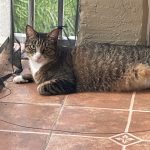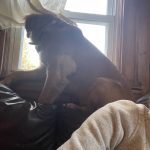Hello,
There are many reasons why pets might vomit. It’s best to figure who, or how many are vomiting and then talk to your vet about it. In some cases it can be intestinal parasites (diagnosed with a fecal sample sent to the lab) or eating too much too fast, or allergies or other diseases are also possible.
Good evening,
My wife and I are struggling trying to help our cat with megacolon and obstipation. He was diagnosed over 4 years ago but he had been put on a Royal Canin GI diet that worked wonders. It suddenly became unavailable and our cat deteriorated rapidly. He had to be hospitalized for a week to remove the blockage and we’ve gone back and forth with the internist on how to move forward. He’s currently on miralax, Lactulose, Cisapride. We recently introduced an anti-nausea medication and appetite stimulant as he stopped eating a few days ago. The suspicion being that he just becomes backed up again. At this point it’s been multiple hospital stays and several thousands of dollars trying to help our guy.
I watched the video on regular palpation – it’s difficult in our cat, both personally and from the vet, due to his large size. He’s a very long cat and also a chunky boy.
Do you have any guidance on palpation in obese cats? Suggestions we can explore with our vet?
I’m worried we’re looking at the colon surgery to remove part of it – but the vet noted many cats are unable to form or control stool following that and have constant diarrhea.
At this point if we can’t get him stimulated at home and eating a little and defecating a little we’re likely headed back to the animal hospital.
I appreciate any guidance or suggestions.
Comments
Hello to everyone,
I have three cats (2 boys & one girl) and I believe one of them keeps throwing up their food. I have been feeding all of them with dry food since day one. I just started to notice a few months ago. Doesn’t happen A lot but it does happen often. I ordered cat grass to see if that would help which it did for a little bit. I also bought those new cat bowls which I feel that also helps but I just noticed he still vomiting his food. Not sure what to do.
Comments
Hello Dr Magnifico
I watched your video on Beerus the cat (Megacolon/ Obstipation) on YouTube! Currently my 8 year old English bulldog was diagnosed with megacolon. My dog is my life. The last week I’ve spent $4000 which included a deobstipation. The deobstipation wasn’t successful as there is a hard piece deep in the colon. They stated they removed a good amount but couldn’t reach the hard piece deeper in the colon and he will need two more procedures. I truly can’t afford to spend any more money and I don’t want anything to happen to my dog. Each procedure is about 2500 in the area and that only includes 24 hour care. Right now he is feeling much better but that piece is still in there. I’ve increased his exercise to 2-3 short walks. I’ve also changed his diet. Chicken, very little rice, raw liver, flaxseed, watermelon, blueberries, coconut oil, green beans, carrots and pumpkin. He’s feeling much better and is having diarrhea which I hope is chipping away from that hard piece. Can you recommend anything? Days ago he was vomiting, shaking, couldn’t walk, didn’t eat or drink and was lethargic. It was so scary! I literally would do anything for this dog. But I can’t keep shoveling out thousands of dollars and not get any results. Anything would help, I can’t have anything happen to my boy. You also mentioned to learn how to palpate the abdomen. Can you explain how that is done. Any help or recommendations would be much appreciated. Thank you!
Comments
Hello!
My dog Glorie was attacked by another dog last Saturday. She is on Carprofen, Clavamox, Gabapentin and CefPod. She had sutures and a penrose drain placed, amd two days ago the drain was removed. My questiom is regarding a large puffy lump immediately to the left of her sutures. When I palpate the lump, it feels like subcutaneous fluid, but it doesn’t seem to hurt her. The vet said to come back if it was red, hot to the touch or seeping pus, but didn’t tell me what it is or if it would go away.
Does this sound like a seroma? And if so, what is the beat treatment? My main concern is infection once she stops taking the antibiotics. I’ve veen doing warm compresses without seeing any impact. Should I take her back in and ask them to do a needle aspiration? Place another drain? Lance and flush? None of the above?
Please help a worried dog mama out! Glorie is my furry daughter and I want whatever is best for her!
Comments
My cat gave birth to her first litter last night and everything seems to be fine but she may have a slight fever. I’ve done a lot of research and I’ve given her wet food and added water to it while she eats, but she’s not drinking water directly from the bowl. What else can I do?
Comments
Hello. My 4 year old cat has known allergies and therefore, is often pawing at her ears. I clean them weekly with Salicylic Acid (as prescribed by our vet). 2 days I noticed that she as a foul odor coming from her ears. Is this a part of her ear allergies or is it an infection? I’d hate to drag her into the vet (very stressful for her) for them just to tell me the odor is a part of the allergy. I also do want to ignore thing if the problem has gotten worse. Thank you!
Comments
Hi. My cat was diagnosed with a throat polyp, however, my vet does not perform the procedure. They referred to a specialist with the cost of 3k. I live in the western suburbs of Chicago and was wondering if anyone has a referral for a much less expensive possibility. Thank you-
Comments
Possible anal sac issue? I am currently unable to drive due to a tbi so I’m trying to figure out if this can wait until Monday or not. She is a 4 year old lab mixing started licking the area last night. Other than that, she’s going to the bathroom fine and she has a little area of concern which I’m attaching the picture for. She’s acting normal, eating, drinking, playing.
Comments
I brought my 12-year-old cat into the vet today. He hasn’t been eating or drinking a lot so they decided to hydrate him. Since I brought him home, his breathing has been shallow and he is coughing a lot. I am seriously concerned. I don’t hear much air moving in his chest. I have no idea what may have caused this. What a bummer on the back of hydration caused him to not be able to breathe? The fluid is already disbursed throughout his body, so I thought he would be feeling better by now. I know that this has helped to park him up before. Please help
Comments
Hi all! I hope someone on here might be able to shed some light on the mystery going on with our 6 month old male golden retriever. We got him at 10 weeks and kept him up to date with shots and all was fine, but about 6 weeks ago we started noticing a little bit of swelling in his front armpits (one side more pronounced than the other) we kept an eye on it and eventually brought him to the vet when it continued to grow. The vet did a needle aspiration and saw bacteria in the murky clear/slightly yellow fluid and prescribed antibiotics. We brought him to another vet a week later who suggested surgery to drain the fluid and tried that. The lump stayed down for a week while he was healing (on sedatives and antibiotics) but now it is starting to grow again! The idea of it being a seroma has been considered but no one can really nail down what is going on or why. His blood panel is completely normal, the biopsies from the fluid and tissue show no indicators of cancer, and the only strange thing was a high level of calcium in the fluid (there were more scientific terms used but I do not recall them)… he scratches at the lump pretty frequently but other than that he acts completely normal and healthy! We noticed that scratching tends to make it grow/become inflamed and if he leaves it alone, it will shrink down significantly… it is all so strange so if anyone has any ideas I would greatly appreciate it! Here are some pictures post-op if it helps at all! Thank you so much!










Hello,
Have you directed these questions to your vet? Have you asked them to help you cate for your cat at home? I teach my clients how to palpate and I also have them give lactulose. Miralax and cat lac along with watered down wet food only. I try to avoid dry food. I also think the fat cats need to get healthier with walks exercise and this helps the gut stay active and make constipation less likely. I always believe constipation is secondary to something else. Like obesity or poor diet or lethargy. Cats should be at a good weight with good muscular body condition. I encourage walking on a harness, playing and using food as a way to encourage activity. Try a feeder ball or scattering small amounts of food across the room so they have to “hunt” for it. Also car grass and cat hip might help. These cats are too often too fat and too sedentary and that compounds the problems.